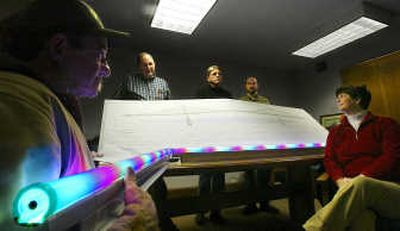Group lighting up Narrows bridge

TACOMA – For the citizens group trying to light up the Tacoma Narrows bridges, the past 12 months have amounted to a rough sort of Politics 101.
The year began with an outpouring of verbal support from just about every government agency you can think of. All seemed to share the vision that lights on the two mile-long suspension bridges would be an aesthetic delight and turn the structures into “highly recognizable, world-class icons.”
But so far, none of the public agencies that seemed so high on the idea has coughed up a nickel to help pay for the project.
“We were a little naive,” said William Beecher, a Tacoma attorney who’s among a dozen or so core members of NarrowsBridgeLights.org.
Even so, members of the group raised glasses to each other Wednesday night, celebrating what they believe is significant progress. They remain confident they can put at least some lights on one of the two bridges in 2008.
The Legislature has allocated $1.5 million toward the effort. That’s almost enough to string lights along the main cables of the new bridge. Supporters say they need $1.8 million.
Doing the entire job right would cost $6 million, advocates say. That would be enough to light both bridges with fixtures along the main cables as well as on the four bridge towers.
Until this week, NarrowsBridgeLights had been laboring under the misconception that it needed to find a government agency to take the lead on the project in order to collect the $1.5 million in state money.
On Wednesday, after months of rejections from public agencies, the group found out it can incorporate as a nonprofit organization and become eligible to collect the money itself.
“We don’t need to go knocking on any more government doors, begging them to take this on,” said Desa Conniff, another Tacoma attorney. “We can do it ourselves.”
Once the group is incorporated, Conniff noted, it also can accept tax-deductible donations from private citizens, corporations and foundations. And it will be able to avoid time-consuming studies and red tape common to government agencies.
That was good news, but it came with another not-so-cheap political lesson: For the trouble the state has taken holding the money and handing it over, it wants a 1.25 percent cut of the $1.5 million. That’s $18,750.
More good news: There’s been no organized resistance to the lighting effort, unlike other cities where groups have passionately complained about unnecessary use of electricity, light pollution in the night sky, traffic hazards and even the disorienting effect on migratory birds.
The main reason, members of NarrowsBridgeLights believe, is their commitment to making sure that none of the expense of lighting the bridges will come from tollpayers or new taxes.
Also, the hardware they’ve chosen is highly efficient light-emitting diode fixtures, indirectly powered by solar panels.
“We can produce more than enough power to run the lights and sell the excess to help pay off the bridge,” said “Solar” Richard Thompson, a Tacoma solar power expert and an enthusiastic member of the group.
The LED fixtures are “dark-sky-friendly,” Conniff said.
They’re also long lasting (about 10 years depending on how often they’re switched on) and energy-efficient. The cost of keeping them lit an average of six hours a day would be about $6,000 a year, she said.
At this point, the group plans to use 8-foot-long LED tube fixtures specially designed by Color Kinetics, an innovative LED lighting firm in Boston, recently acquired by Royal Philips Electronics.
The fixtures would be fastened to hand ropes already installed on top of the main suspension cables.
Maintenance, the group says, will amount to little more than wiping off the lenses occasionally and replacing worn-out fixtures. The state Department of Transportation, an enthusiastic (though nonpaying) supporter of the effort, estimates the maintenance cost at $2,000 a year, Conniff said.
Each tube contains thousands of LEDs that can be controlled with computer software to produce an infinite combination of colors and special effects.
“This is so sophisticated we could even have colors change with the speed of the wind,” said Mike Glasman, an electrical contractor who has volunteered his services to the effort.
At a group meeting Thursday, other ideas popped up like flashbulbs: doing the bridge up red on Valentine’s Day, amber during Amber Alerts, having the lights dance in time to music or having them pulsate along the bridge at 55 mph so drivers would know when they were speeding.
Glasman shushed the talk, having learned enough about politics in the past year to know not to get too carried away in front of a reporter.
“Not that we’re going to use it that way,” he quickly added. “We don’t want people to think we’re going to have a circus show here.”